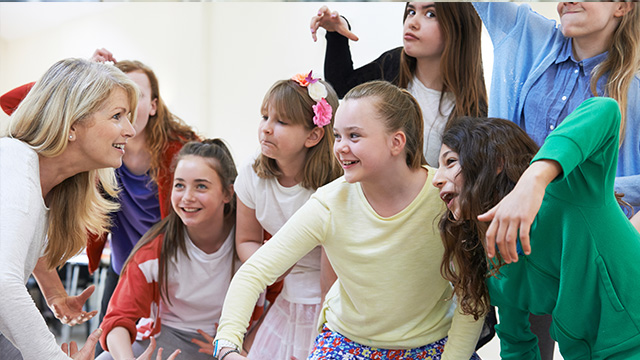5 Theatre Games Every Drama Teacher Should Know
Written by Meaghan McKiernan
July 29, 2017
Have you ever found yourself at the beginning of the school year looking for ice-breaker games for your students? Do you often notice students stuck in the same old acting habits? Are you looking for a fun way to get your acting students to think on their feet? Here are five games all theatre teachers should know about.
1. Zip Zap Zoom

This quirky, fast-faced game will challenge your students to think on your feet. All students stand in a circle shoulder to shoulder. The rules are simple: clap to the right is “Zip”, clap to the left is “Zap”, clap across the circle is “Zoom.” One student starts by choosing any of the funky words and speaking it aloud along with the correct action. You can repeat the actions as many times as you want. If a student gets the word or action incorrect, they are then out. The last person standing wins.
2. The Machine Game

This is a great game to get those creative juices flowing in your students! One student is instructed to stand at the front of the room and combine an action with a noise. For example, they could click their tongue and raise and lower their left arm. The student continually repeats this sound/action combo while other students go up to join him/her. The joining students can form in any position around the original player but must all be connected somehow (a hand on the shoulder, laying on their feet, etc.) The goal is to create a working “machine.” Once all the students have formed their machine they must all decide what their machine does.
3. The Prop Game

The prop game is an exercise for students that will get them thinking beyond their limits. To play, two to three students stand at the front of the room and are instructed to find any object in the room to use as their scene prop. After they have chosen their props they may break out into a short improvisation. The catch- their prop cannot be used as the actual item it is! This never fails to get creative juices going and a few laughs going.
4. The Question Game

Think fast and just keep talking! That’s the best tactic for this concentration game. The question game is played by separating your students into two teams. The teams should line up in a straight line with the line leaders facing each other. One leader starts with a question and the other line leader must respond with another question. The questions need not all be related, but must be in a continuous flow without hesitation. If one leader hesitates or speaks anything that is not in the form of a question, they are then out of the game. The winner of that round then goes to the back of their line. The game continues with each new pair of line leaders until one team is left.
5. The Beep Game

This is a great game to get students out of their old acting habits or regular choices. To play this game, two to three students are given a scenario for a scene that they will improv dialogue and character formation for. It should be something generic that they can do anything with. One student observer is given the position of “The Beeper”. Whenever they choose, The Beeper may say the word “beep” and the actor speaking must change the last thing they said. The goal is to move the scene in a more interesting direction than his/her previous choice. The scene can go on as long as the instructor of the game feels is natural.
Need some advice? We’ve got you covered.
- 10 Basic Rules of Stage Combat (That Keep Everyone Safe)
- 5 Advantages of Learning Stage Combat
- Don’t Be a Diva: Common Pitfalls and How to Avoid Them
- 9 Articles of Clothing Every Thespian Should Keep In Their Wardrobe
- What Makes an Actor Website WOW?
- “Is my attitude not getting me roles?” And Other Essential Questions for Actors
- 6 Steps to Memorizing Shakespeare
- 10 Tricks to Staying Healthy All Season Long
- What Does It Take to Break Into Voiceovers?
- 5 Tips for Nailing Your College Music Theatre Audition
- 10 Tips on Owning the Room at Competition
- How to Balance Theatre and Coursework
- The 10 Secrets of Great Understudying
- 10 Items Every Actor Should Carry in Their Rehearsal Bag
- 10 Items Every Dancer Should Keep in Their Rehearsal Bag
